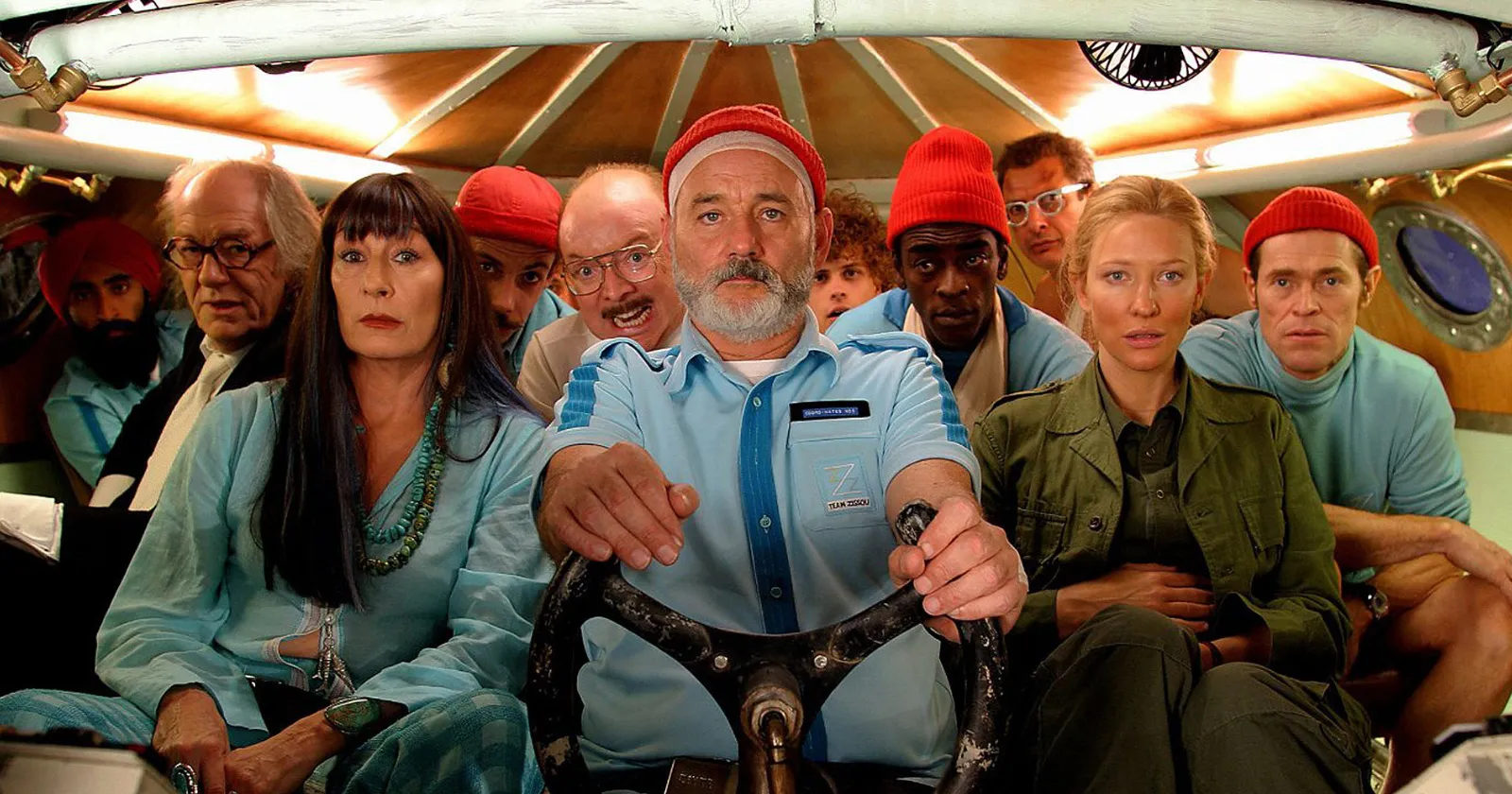Wes Anderson’s The Life Aquatic with Steve Zissou (2004) may never be the most celebrated or critically lauded of his movies, but it’s undeniably one of his most distinctive. Over time, its stature has grown—not just as a quirky outlier, but as a poignant, unpredictable exploration of legacy, family, and self-reckoning. It’s a movie about a man who tries to film everything so he doesn’t have to feel anything, only to discover—too late—that the feelings are all that matter. For all its eccentricities, it sticks with you.

‘The Life Aquatic with Steve Zissou’ Movie Review
The Life Aquatic with Steve Zissou has long existed in a strange pocket of Wes Anderson’s filmography. Sandwiched between the early acclaim of Rushmore and The Royal Tenenbaums and later beloved works like Fantastic Mr. Fox and Moonrise Kingdom, it often felt like a detour—oddly ambitious, tonally chaotic, and narratively adrift. But on revisiting the film, its seemingly scattered energy and tonal imbalance start to feel like the point. This is Anderson at his most unruly and emotionally vulnerable, and that messiness is ultimately what gives the movie its soul.
The Life Aquatic with Steve Zissou follows the misadventures of washed-up oceanographer and documentary filmmaker Steve Zissou, played with deadpan arrogance and subtle sorrow by Bill Murray. After losing a close friend to a mysterious jaguar shark during a failed expedition, Zissou sets out for revenge under the guise of finishing his latest documentary. Along for the ride are a makeshift crew of loyal misfits including Klaus (a wonderfully earnest Willem Dafoe), a pregnant reporter (Cate Blanchett as Jane Winslett-Richardson), and Owen Wilson’s Ned Plimpton—a mild-mannered pilot who believes he might be Zissou’s long-lost son.
The movie hops from one exotic setting to the next, both above and below sea level, and takes surprising turns involving pirates, rival filmmakers, and sudden emotional confrontations. It’s not a tight narrative, and for many, that’s been the sticking point. But rewatching it now, what once felt like indulgent tangents play more like necessary deviations—disruptions that mirror the interior fragmentation of its central character. Zissou is unraveling, and the film unravels right alongside him.
There’s a jagged bitterness at the heart of The Life Aquatic that’s reminiscent of Rushmore, as Anderson explores the ego, insecurity, and narcissism of a man trying to reassert his relevance. Zissou isn’t a particularly likable figure, and Anderson makes little attempt to smooth his edges. He’s callous to his crew, exploitative of Ned, and more concerned with his cinematic legacy than human connection. And yet, like so many Anderson protagonists, he’s deeply human—a man crushed by the weight of disappointment, failure, and self-delusion. It’s only when he’s forced to reconcile with the possibility of family, vulnerability, and loss that the movie finds its emotional current.
The supporting cast is, as always with Anderson, carefully curated and deeply committed. Anjelica Huston plays Eleanor Zissou, Steve’s estranged wife and the emotional ballast of the film, while Jeff Goldblum shows up in full smarm mode as Zissou’s more successful rival, Alistair Hennessey. The interactions among this ensemble are full of dry wit and subtle tragedy, with Anderson’s signature blend of arch dialogue and theatrical staging amplifying every awkward silence and heartfelt confession.
Visually, The Life Aquatic is pure Wes Anderson: symmetrical compositions, pastel color palettes, and handmade visual effects that feel pulled from a storybook. The underwater sequences—featuring stop-motion sea creatures by Henry Selick—are especially memorable, culminating in a final encounter with the jaguar shark that’s as surreal as it is genuinely moving. That scene, scored to Sigur Rós, is among the most quietly powerful moments Anderson has ever crafted, collapsing Zissou’s bombast into something quiet, tragic, and oddly beautiful.
Tonally, the film veers between slapstick comedy and emotional melancholy. It doesn’t always hit the right balance, but when it works, it’s unlike anything else in Anderson’s oeuvre. It’s one of his most daring films—not because it’s the most polished or profound, but because it risks being misunderstood. It leans hard into absurdity and then asks you to take its emotional core seriously. And strangely, it earns that ask.
READ MORE MOVIE REVIEWS: Ocean’s Twelve, Take Out, Memories of Murder
The Life Aquatic with Steve Zissou may never be the most celebrated or critically lauded of Wes Anderson’s movies, but it’s undeniably one of his most distinctive. Over time, its stature has grown—not just as a quirky outlier, but as a poignant, unpredictable exploration of legacy, family, and self-reckoning. It’s a movie about a man who tries to film everything so he doesn’t have to feel anything, only to discover—too late—that the feelings are all that matter. For all its eccentricities, it sticks with you. That’s the mark of a great film, even a strange one.
Score: 8/10
The Life Aquatic with Steve Zissou (2004)
- Cast: Bill Murray, Owen Wilson, Cate Blanchett, Anjelica Huston, Willem Dafoe, Jeff Goldblum, Michael Gambon
- Director: Wes Anderson
- Genre: Adventure, Comedy, Drama
- Runtime: 119 minutes
- Rated: R
- Release Date: December 25, 2004
- Movies Like The Life Aquatic with Steve Zissou: Barbie, Everything Everywhere All at Once, Beetlejuice Beetlejuice, More Movies Like The Life Aquatic with Steve Zissou
Read More Reviews for Wes Anderson Movies
Cinephile Corner has reviewed the following Wes Anderson movies: